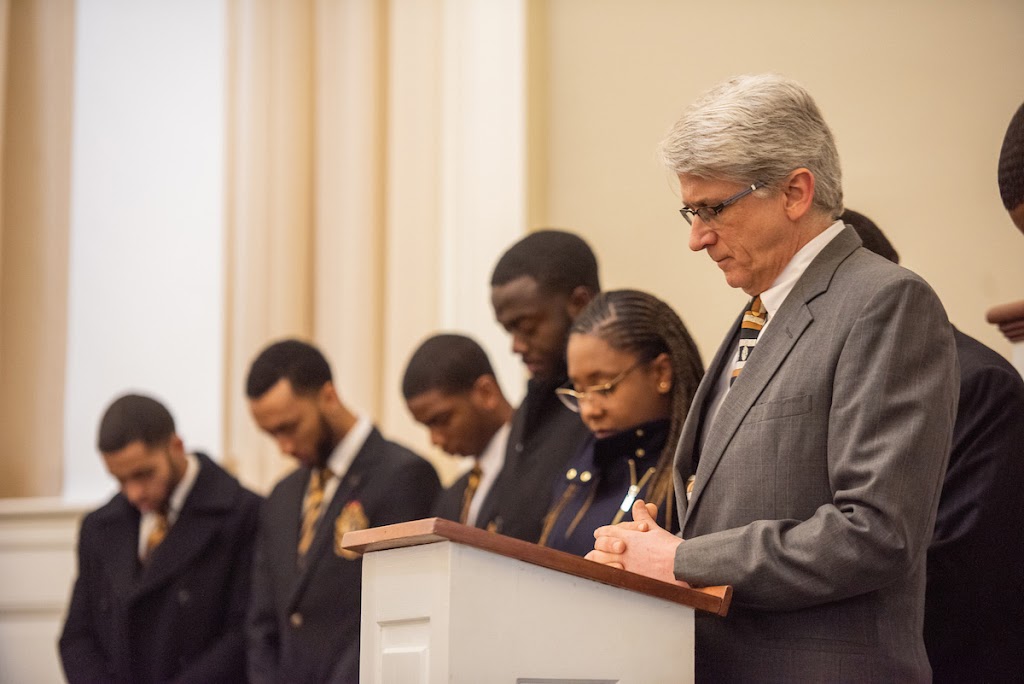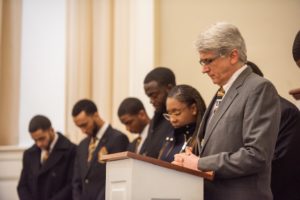- Starting this week and until further notice, Thursday Supper will be offered as a take-out option; Saturday Lunch has been canceled until further notice. Guests at the meal can expect distribution of some of UCM’s store of perishable food, as we seek to ensure that food resources we have been able to accumulate do not go to waste.
- For all other purposes, UCM is closed until further notice. This includes regular UCM programming, as well as meetings of community groups scheduled to take place in UCM’s building.
UCM staff will be periodically checking our voicemail and email, and will respond to contacts as quickly as we are able.
Because we want to help where we can, we’ll be sharing information and resources on social media and via email as it becomes available, and we want to hear from you what you know and what you need that we might be able to help with. - UCM staff will be periodically checking our voicemail and email, and will respond to contacts as quickly as we are able.
- Because we want to help where we can, we’ll be sharing information and resources on social media and via email as it becomes available, and we want to hear from you what you know and what you need that we might be able to help with.
A Prayer for MLK Day 2020
On January 20, UCM Executive Director Rev. Evan Young delivered a prayer at the beginning of the 20th annual MLK Silent March at Ohio University. It was an extemporaneous and heartfelt prayer, and it has taken us some time to find a recording and transcribe it for sharing. We’re indebted to Athens NEWS Associate Editor Conor Morris for sharing with us a recording of the event, our transcription of which we now share with you.
Transformative Social Justice Work and Ecumenical/Interfaith Campus Ministry
One of the great challenges of doing social justice work in the present age is that the pace of our information economy undermines the spiritual discipline of memory. In the 24-hour news cycle that increasingly defines our experience, today’s news effectively displaces and erases yesterday’s news, and renders us both rootless and directionless. As the great labor historian and folk singer Utah Phillips said, “the long memory is the most radical idea in this country. It is the loss of that long memory which deprives our people of that connective flow of thoughts and events that clarifies our vision, not of where we’re going, but where we want to go.”
UCM’s story is rooted in the modern ecumenical movement within Protestant Christianity. The modern ecumenical movement was founded on a call for Christian leaders throughout the world to work for peace and justice. This call was a new expression of a millennia-old yearning for a return to unity within the Christian Church—unity that perhaps never existed, and certainly had not existed since the 4th century of the Christian era. The most important—and potentially fruitful—locus of that unity was in our shared ethic of service and restoration. So the movement sought to continue, expand, and integrate efforts of unifying the church globally around the idea of helping all those in need, whether that need be physical, emotional, or spiritual. The movement promoted an understanding amongst the churches that, despite difference, they could join together to be an element of great change in the world, an agent of hope and peace amongst the chaos and destruction that humans seem to create.
This is where UCM comes from, and why we look the way we do. This is the history that underlies our programming and our ministry. This is why there’s a Thursday Supper and a Saturday Lunch, this is why there’s an Appalachian Ohio alternative spring break service/learning trip. And ultimately, as our understanding and identity have expanded beyond the traditional bounds of Christianity, this is why we’ve devoted ourselves to building interfaith relationships of understanding and trust—to addressing our common need to be welcomed, accepted, honored, and attended to within the communities in which we live. This is the story we continue to tell, to invite others into, and to pass on as our heritage of transforming love.
On the Day After the 2018 Election
Today is a good day to breathe, to visit, to share a coffee or other beverage with a friend and comrade, and to reflect on the transformative work your relationship is doing in each of your lives. I know my relationships with the folks I’ve been working with for the last two years have changed me in deep and lasting ways. And for that, today I’m giving thanks and praise.
|
Shattering the previous record, at least 114 women won statewide or federal seats across the country—including 94 US House seats, 12 US Senate seats, and 8 Governorships. These women include a number of firsts: the country’s first Muslim and first Native American women elected to Congress, the youngest women elected to Congress, Massachusetts’ first black congresswoman, the first woman Governor of Guam, and the first two Latina congresswomen from Texas.
Colorado elected the country’s first openly gay Governor.
In statehouses across the country 129 LGBTQ state legislators will soon take office—including Ohio’s own Senator-Elect Nickie Antonio, who will be the state’s first openly LGBTQ State Senator.
|
On the Pittsburgh Synagogue Shooting
Like you, I am horror-struck by the synagogue shooting in Pittsburgh this past weekend. Heart-sick, dismayed that such a thing happened, could happen, anywhere in this country but particularly in a city and community I’ve visited and loved, where people I know and love are reeling and hurting and grieving together. The impact of such a thing happening in a place of worship that serves as sanctuary and community center is beyond my power to imagine. And that all I have to offer is my sympathy seems very weak tea indeed.
On “trans*”
On the Approaching Election
Rev. Evan Young, Executive Director
In this election season, there’s something I want to make sure to say to you.
Voting is highly recommended.
Not because it’s the be-all and end-all of participatory democracy, not because it’s some panacea that holds out the promise of curing all our nation’s ills. I’m well aware of the significant flaws in our democratic process, as currently practiced. Well aware of the interests it weights too heavily, well aware of the interests it excludes from the conversation, well aware of the corrosive influence of money and its erosion of the power of our representative democracy to . . . well, represent.
I still highly recommend that you vote. Because it’s a gateway activity to the kind of engagement and activism for social justice out of which real change can emerge. Take the time to become educated about the choices on offer in this election season–both candidates and issues. Let your research stimulate questions and lead you into reflection on the world we have, the world you want to see, and what it’s worth to you to take action to move us in the direction of your vision. Let your reflection lead you into action, collaboration, and deeper, more interdependent relationship with people who share your vision (or who embrace a vision you had never imagined before that fills you with hope for the future).
Voting is the low bar, the entry point, the first step on the path toward engaged, informed, contributing citizenship in our community, our nation, the world. So do it. And be advised–since our current leaders are invested in limiting access to the means of participation (i.e., voting) particularly in strongly liberal/progressive areas (like Athens), you should take advantage of the opportunity to cast your vote early (for days, times, and locations click here). Avoid long lines and make sure your vote is cast, recorded, and counted. And then . . . get to work.
The events in Charlottesville, Virginia have been front and center in our thoughts. As we prepare for the return of students to OU’s campus, we’re thinking, “Charlottesville is a college town. Like Athens.” And wondering when what happened there will come here—and what we’re going to do about it.
White supremacists are marching and rallying openly in the streets of our nation. In the week since Charlottesville, they’ve marched and rallied in several other cities. They’re advocating policies and practices that give preference to white people and treat nonwhite people (and immigrants, and LGBTQ+ folks, and non-Christians, and women) as “less than.” They’re openly threatening violence—not just isolated violent acts, but a mass campaign of violence—to promote their vision and to force its adoption as policy.
Yet more disturbing is the extent to which they have gained the ear, the sympathy, and the support of key political and government leaders—from the President to members of his administration to leaders of his political party, both within and beyond the legislative and executive branches of government. President Trump’s failure to condemn the words and actions of the individuals and groups who organized the “Unite the Right” rally in Charlottesville, who marched through those streets chanting “Jews will not replace us!” and “Blood and soil!,” is a stain upon our collective identity, integrity, history, and community. The false equivalency he has drawn between the white supremacist demonstrators and those who gathered to protest the message of hatred, bigotry, and oppression is an insult to our collective intelligence. And the silence—or overt and enthusiastic agreement—of his supporters in the face of this insult is an embarrassment to us all.
This is not a political issue. It’s a moral issue. It goes to the heart of our faith commitments to affirm and promote freedom, justice, and community for all. We have found that in order to be true to our faith (our faiths, really, since we have many traditions represented on our staff, on our Board of Directors, and among our students, supporters, and donors), we must speak to this. And we must be unequivocal. We stand against those who believe that the right to rule this country must be reserved for “white” people. We stand with those who seek equal rights, opportunity, and protection for all people, whatever their race or nationality or immigration status or sexual orientation or gender identity. We recognize the painful and problematic presence of racism and white supremacy in our past and our present, and we are committed to educating and equipping ourselves and our communities to right those wrongs. If this sounds like you, or like what you want to be and to do in this town and this world, we stand with you. We want you to know that you’re not alone in this struggle, and we want to invite you to reach out to us and to each other for encouragement, for support, for challenge or a listening ear. We’re going to need each other.
Because the students are coming back. And they’re talking about this. They’re hurting, maybe afraid that Charlottesville is coming to our college town, in one form or another. They’re going to need all of us—our presence, our heart, our witness, our dedication, our faith. And we’ll need to be prepared, because Charlottesville IS coming to our town, one way or another. Our prayer and intention is that UCM will be ready with a faithful response—our campus and community need that from us. And we need you. Because we’re better, stronger, and wiser together.
Convenient up-town location just off Court Street and a block and a half from Ohio University. Beautiful hardwood floors and built in shelving. And the best office neighbors. AND your rent goes to support the work and mission of UCM!
Approximately 13ft x 14ft on the 2nd floor in the United Campus Ministry building. Ideal for a non-profit organizations, professional office or research/writing. Additional meeting space, kitchen and dining/event room available for free use. Includes WIFI and all utilities except land line. Call 740-593-7301 or email jennifer@ucmathens.org NOW to scheduling a visit to check it out!





